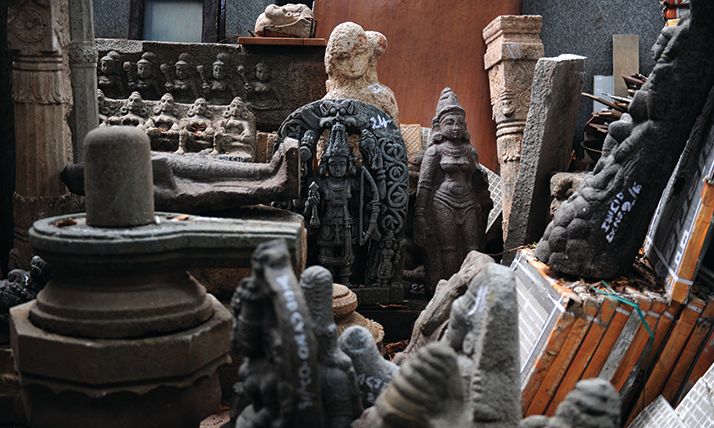Some of the hundreds of artefacts recovered from an art dealer believed to have looted them from Hindu temples Arun Sankar/AFP via Getty Images
Curbing the illicit trade in cultural goods will be the subject of a major conference in Paris on 1 February, organised by France, which holds the presidency of the Council of the EU in the first half of the year.
The meeting, which will take place via video conference from the Musée du Louvre, aims to define “new proposals that could be submitted to the European Commission” within the next six months, says Jean-Luc Martinez, the museum’s former director, who now serves as France’s ambassador for international cooperation on cultural heritage.
The conference will focus on practical applications with an emphasis on the challenges of the digital age.
Law enforcement authorities and specialists from France, Italy, Spain, Germany, Poland, Greece and Cyprus, along with NGOs and international bodies such as Interpol and the World Customs Organization, will discuss new technologies for tracking fraudulent works of art as well as the development and coordination of databanks between countries.
Another topic on the agenda will be ways to educate the public about the fight against archaeological looting and trafficking, which could include exhibitions of recovered looted properties across Europe. Specialists from Unesco and the Aliph Foundation (the International Alliance for the Protection of Heritage in Conflict Areas) will also be involved in the conference.
Yesterday, Aliph held its own fundraising conference with European governments and sponsors for the continuation of its activities in the Middle East and Sahel. The Geneva-based foundation raised $90m at the event.
The French government has also invited key art market figures to participate. Vincent Geerling, the chairman of the International Association of Dealers in Ancient Art; Guillaume Cerutti, Christie’s chief executive; Alexandre Giquello, Drouot’s chairman; and Henrik Hanstein, the spokesman for the European Art Market Coalition, will discuss the impact of measures against art trafficking on the art market, with the Swiss lawyer Marc-André Renold and two representatives of the European Commission, Alessia Di Grigorio and Valérie Ledure.
Martinez, who authored a 2015 report on the illicit trade of cultural goods after the destruction of heritage sites by Isis, has previously insisted that “it would be more useful to have the art market fully participate in this general mobilisation than to feed a confrontation between states and antique dealers”.
The art market has been up in arms against recent controls instituted by the European Commission, such as the 2019 regulation on imports of cultural goods created or discovered outside the EU. The European Commission has until June 2025 to set up a centralised electronic system to monitor the import licences now required for antiques and cultural goods entering the continent.

